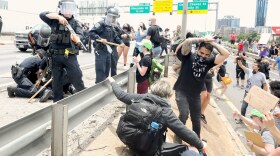"No-knock" search warrants, which allow police to force their way into a home with the element of surprise, have attracted criticism since the height of the "war on drugs" in the 1980s and 90s. But it wasn't until this year that the death of Breonna Taylor galvanized that criticism into a national movement to ban the raids.
Taylor was shot to death in her own apartment during a questionable drug raid by Louisville police. Now she's become a symbol.
"Do we really want to be jeopardizing the lives of individuals for drug searches?" asks Connor Boyack, founder of the Libertas Institute, a Libertarian think tank in Utah which is pushing for new limits on forcible entry raids.
"We've seen it in Utah, we've seen it with Breonna Taylor," he says. "We're losing lives with this, on both sides of the firearm, and so is it worth it?"
"The way that you would authentically honor Breonna Taylor's life is to ensure that we stop the practice and tactic of no-knock raids," says Katie Ryan of Campaign Zero, another organization that's joined the movement for fewer raids. They've launched .
In the course of that work, Ryan says activists have realized it's not enough to focus on no-knock raids.
"We actually have to be more stringent about all types of search warrants, and especially knock-and-announce warrants," Ryan says.
"Knock-and-announce" warrants are far more common than no-knocks, but they can happen almost as fast. The raid that killed Taylor may in fact have been executed as a knock-and-announce, even though police had a no-knock warrant in hand. In the aftermath, an officer told Taylor's distraught boyfriend, Kenneth Walker, that they'd announced themselves three times.
That's why Ryan says new rules should go beyond "no-knocks."
"Flimsy legislation would not stop officers from technically knocking and announcing — hitting the door once, saying 'Officers,' then using the battering ram and shredding someone's door," Ryan says.
Ryan's group has proposed a checklist of conditions for all police search warrants: with some exceptions, officers should be in uniform; they should do the raid during the day; and they shouldn't rely on out-of-date intelligence about who lives in a targeted home.
This fall, Virginia state delegate Lashrecse Aird got a number of those rules passed into state law. But she wasn't able to get agreement on another one of Campaign Zero's suggestions: a minimum 30-second wait time.
"Knock, announce, wait... for someone inside to respond, to gather themselves," Aird says. "You know, make a decision about how they're getting ready to choose to interact with law enforcement."
She says the minimum time rule ran into resistance from other legislators who thought it might be too dangerous for officers.
Thor Eells, a former SWAT commander from Colorado Springs, Colo., now executive director of the , echoes that concern.
"To have a blanket stipulation of a mandated time for waiting just increases risk," he says, because sometimes a risk analysis indicates a no-knock or fast-entry is the safest alternative for everyone involved. "We don't want to lose options."
At the same time, Eells says in his experience, there has been a "radical" movement away from too much reliance on fast-moving raids.
"I would say in my career as a young SWAT officer, probably 80 to maybe 90 percent of our warrants were no-knock warrants," he says. "And yet, when I retired, it probably made up somewhere in the neighborhood of 5 percent or less of the warrants that we were serving."
The lack of national statistics on police raids makes it hard to know how wide-spread that trend is. But Eells says his association now teaches that no-knocks are a "last resort."
Still, he says he hopes legislatures will resist the pressure to take them off the table altogether.
"While I fully understand the emotional response to to this," he says, "what I think we have to do is be very careful in that we slow down and think about what is our end goal and how do we accomplish that."
Copyright 2020 NPR. To see more, visit https://www.npr.org. 9(MDA3MzEzNjc2MDEzMDI2Mzc4OTc4NTFmNg001))











